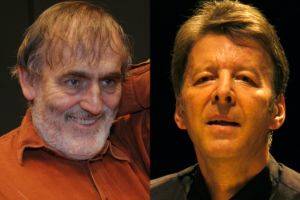Talk
Helmut Lachenmann / Peter Ruzicka
Music as a Composed Message
On the Role of New Music in Society
Introduction: Joachim Sartorius

Helmut Lachenmann, Peter Ruzicka © Astrid Karger, Promo
A talk with both composers
What is the significance of musical composition today? The work of the artist has regained a special responsibility in our almost completely rationalistic and consumerist society. Dissonance, complexity and difficulty are inherent to the logic of serious artistic work. It is not the composer who is complicated, but the conditions of his life and his work. Both Lachenmann and Ruzicka insist upon their social responsibility. Helmut Lachenmann’s compositions combine extreme rigour and beauty, linking moral aspirations to a sense of the transcendental. Lachenmann may have learned a lot about the political dimensions of art from Luigi Nono. He was Nono’s sole pupil between 1958 and 1960. His “musique concrete instrumentale” has expanded the musical spectrum, as he has continually created new forms of expression in his “search for liberated listening in a society lacking any real vision for the future”.
Peter Ruzicka learned composition under Hans Werner Henze. The leading motifs in his work are communication and the refusal to communicate, creation and destruction, growth and decomposition. He makes music about music, sound essays about the problems of contemporary composition and the difficult relationship to tradition. Ruzicka is also successful in the field of cultural management – he is a former artistic director of the Salzburg Festival, and he has been artistic director of the Munich Biennial since 1996. He conducts both his own works and those of others.